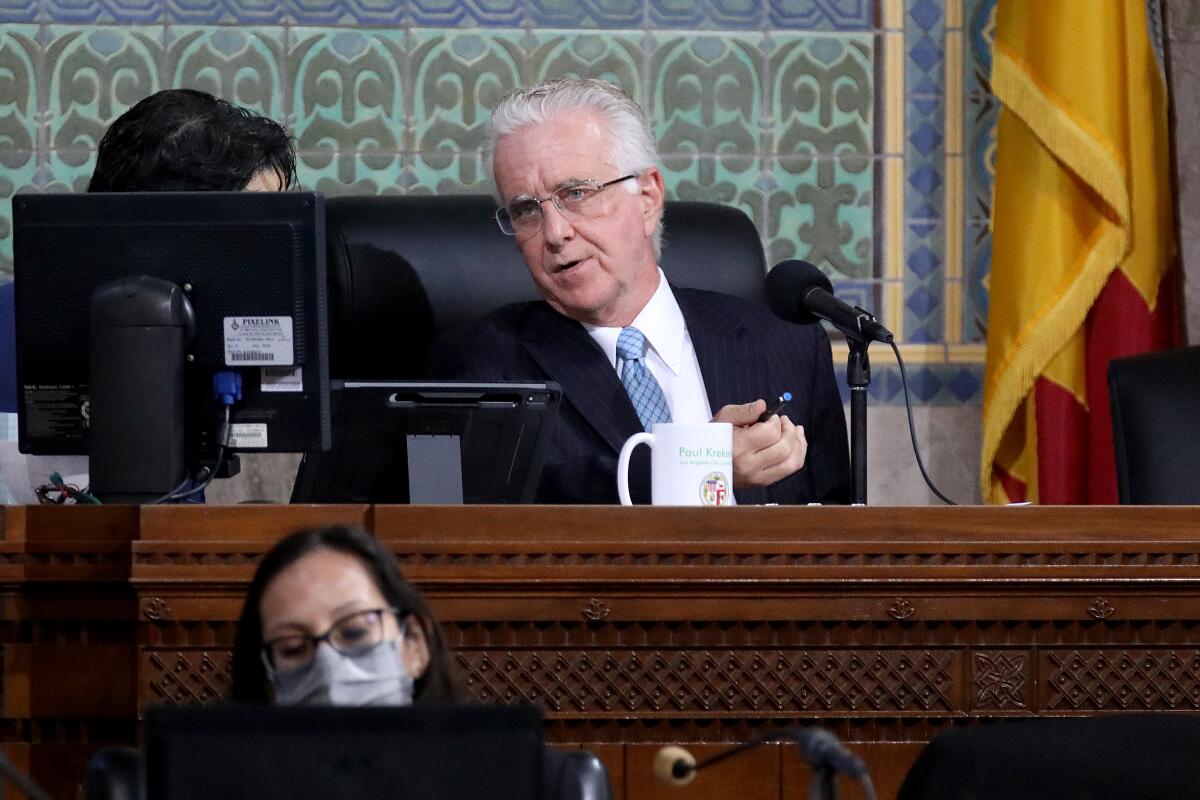Expand the L.A. City Council? A citizens commission will explore that and other ideas

The Los Angeles City Council voted Tuesday to create a new citizen’s commission to look at expanding the size of the council, reducing the number of council meetings and other potential changes to city operations.
The 13-member commission will be charged with developing proposals for the November 2026 ballot that would revise the city charter, which spells out the powers and duties of city departments, offices and elected officials.
The idea of expanding the 15-member council has been circulating for a few years, with several council members signing on to the idea. Council President Paul Krekorian had hoped to send a council expansion measure to L.A. voters in November.
Although a council committee studied the concept over several months, its members never coalesced around a single strategy, leaving the question to the new commission.
Council expansion had drawn support from a number of civic groups, which argued that it would improve community representation at City Hall and diversify the membership of the council.
Godfrey Plata, deputy director of the nonprofit group LA Forward, said his organization and others were disappointed by the council’s failure to act.
“We thought it was procrastination to punt it over to a charter commission,” said Plata, whose group argued last year in favor of expanding the council to 29 members. “But we’re certainly eager to continue a public conversation around it.”
Krekorian, who faces term limits at the end of the year, has continued to argue in favor of expansion, pointing out that the city of nearly 4 million has the same number of districts as nearly a century ago, when its population was much smaller.
Reducing the size of each district would make the council more responsive to residents, he said, while also reducing the influence of “institutional organized money” in elections.
“I think it even reduces the risk of corruption,” Krekorian said last week during an appearance at the Los Angeles Current Affairs Forum.
Krekorian said the new charter reform commission will also look at other issues, including the city’s handling of real estate development, the process of filling vacant council seats and the procedure for censuring or suspending elected officials who have engaged in wrongdoing.
Michael Feinstein, speaking on behalf of the Los Angeles County Green Party, called on the council to ensure the commission also looks at major changes to city elections, including a move to “ranked-choice” voting, which allows voters to rank candidates in order of preference instead of choosing just one.
The last major overhaul of the city charter was in 1999. That year, voters established a system of neighborhood councils and gave more authority to the mayor, among other things. On that ballot, voters also rejected efforts to expand the council.
This time around, it’s not clear how wide-ranging the commission’s work will be. Although the council can forward topics for study, the commission will also collect input from a wide range of individuals and community groups.
Under the plan approved on Tuesday, Mayor Karen Bass will have the power to appoint four of the commission’s 13 members. Krekorian will select two, as will council President-elect Marqueece Harris-Dawson.
Those eight would be appointed in August and September, according to a timeline created for the commission. Once they convene, they would spend three months developing a work plan and selecting five additional commissioners.
The commission’s schedule calls for it to spend much of 2025 deliberating and collecting public input. In January 2026, its proposals would be submitted to the council, which would decide which ones would appear on the November 2026 ballot.
Feinstein, a former mayor of Santa Monica, criticized that arrangement, warning that the council will have the power to reject any of the commission’s proposals. He also faulted the council for allowing the commission to be populated by political appointees.
“This [process] embeds a direct City Council conflict of interest around deciding the future size and powers of the council,” he said in an email to The Times.
The charter reform commission is also expected to look at whether to shrink the number of council meetings — a topic that has exasperated some council members in recent months.
The city charter requires that the council meet at least three days each week. Councilmembers Katy Yaroslasvky, Tim McOsker and Eunisses Hernandez recently backed a ballot proposal to reduce that number to one day per week. But others on the council resisted the idea, saying it needed vetting from the soon-to-be-formed commission.
Separately, the council voted on Tuesday to approve language for two city charter amendments on the Nov. 5 ballot. One would establish an independent redistricting process for the Los Angeles Unified School District, which takes in 26 cities and unincorporated areas in the county and is governed by a seven-member board.
The other ballot proposal is aimed at strengthening the city Ethics Commission, which enforces laws dealing with campaign fundraising, lobbying and other political activities. Under the proposal, the agency would receive a minimum of $7 million per year for its operations.
Backers say this would prevent elected officials from retaliating against the agency by cutting its budget. The proposal also would triple the fines for ethics violations and give the Ethics Commission the ability to hire its own lawyer in some cases.
More to Read
Sign up for Essential California
The most important California stories and recommendations in your inbox every morning.
You may occasionally receive promotional content from the Los Angeles Times.










